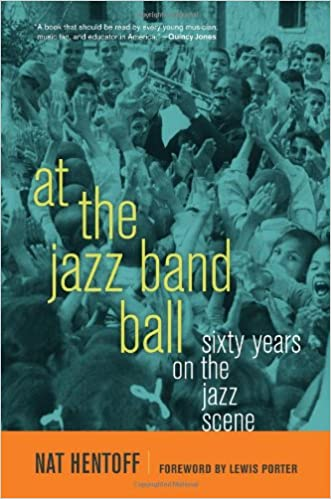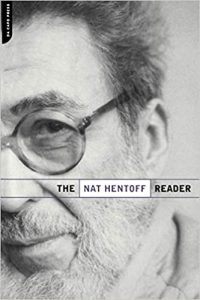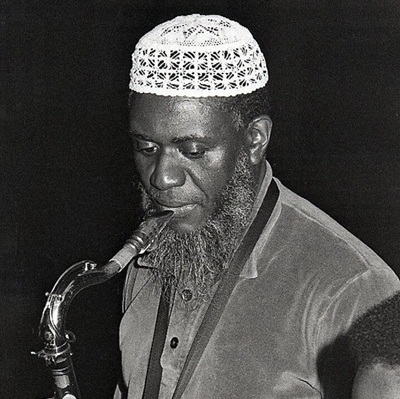.
.

.
Inspired by the essays collected in the jazz and cultural critic Nat Hentoff’s 2010 book At the Jazz Band Ball: Sixty Years on the Jazz Scene, in this series of poems Sean Howard uncovers new relationships and resonances in the author’s writing – reusing, recycling, and remixing text from the book as poetry – while allowing him the opportunity to pay a personal tribute to a writer he reveres.
.
.
___
.
.
the sacred wood
unswervingly ‘deviant’ music (in the future-
present tense)… sacred wood, deep in the so-
lo… (closed, cat’s-eyes open…) yes, Being
played! speaking of god (in the unorthodox
synagogues)… when people really start to
count? the music that stops the Buck in its
tracks? (the not always becoming self!) re-
unionizing (body & soul)… the clarinet on
the horizon. (dizchords.) rags, tags: trad,
modern… (after-gig jam, from black-&-
white to color…) ‘made living’? spare
change… (listening quite the perform-
ance!) the long process of un-
barring… (slums – single-
story tunes.) trane, i’ll
end when the cir-
cle…
.
.
impressions
music, impressing silence… duo: every ‘one,’ self
& other… (booking our own agency…) just so blue,
the sphere from space… … (the butterfly hearing the
pin drop…) words? the cat’s hat… the Seers cat-
alogue. (reunion, psyche & eros…) outplaying
the rules (the left hand of god)… vanguard
parties. vocal eyes. cooking pulses. drum
skins. (blizzards to hand.) bartók: bird
listens. standard impressions?
falling leaves of our
senses…
.
.
ghost writing
a moaning grace. (racism’s constant refrain…) the dream-
darned soul. (art, healing Power?) willow wind. the bass
truth. (crystal, jewish stars…) ‘ghost ships’? slaves
still dying, drumming from below… (but j. edgar
just hearing the devil’s hands…) ornette’s new
country music! (how good? the room, listen-
ing…) hymnself – lord yes, the
blues bringing Christ
down…
.
.
mixed poems
the bars deep in the cells… (democracy’s unfinished
sympathy.) constituting our selves? ‘hunger,’ striking
back… jazz, little rock? black-&-white; montgomery,
still rain? eisenhower’s polar eyes… (precedents in-
augurated…) behind the seens – unheard, the mixing
studios… (riders to the Storm…) washington, black
marble. (holler stories, the spark of history…) con-
gress, body & soul… (capitalism, so many excess
notes!) ‘futuristic’ – social fiction, jazz its own
sweet time! movements – ensembles, floating i-
deas… (getting the rich to listen down!) ming-
us reflecting, deepening the stream… life &
death? between takes… (hoover’s door-
drummers…) coleman’s participatory
democracy – no more leader-arrang-
ers! (going to hell’s neighbourhoods:
chicago, D.C., guns the easiest in-
struments…) the spiritual so
physical: ‘the things that
ain’t, we knead to
be…’
.
.
snapshots
‘don’t ask how!’ remembrance of times to come… jazz, Just
music… (‘bombarded’ – funk, pop, rap, the nucleus always
under attack…) ‘evolving’ – the stage between the lower &
the upper worlds… (players who can hold the Sea…) derail-
ing the training – did chopin play chopin ‘straight’? (snap-
shot: monk, walking by juilliard…) the ‘saddest thing’? em-
pty swing… (‘on the margins’ – can the climate change
back?) still largely segregated, body & soul… record-
ings just scratching the surface? misogyny, ‘men with
deeper pockets’? (the lass ceiling, gagged unless to
sing.) ‘divine’; wearing art’s shawl (& nothing
else)… (when we used to hear the music of
the stars?) ‘test of a solo’? not the
same person… god? first,
contact…
.
.
___
.
.

Sean Howard is the author of five books of poetry, most recently Unrecovered: 9/11 Poems (Gaspereau Press, Canada, 2021). Sean’s poetry has been widely published in Canada, the US, UK, and elsewhere, and featured in The Best of the Best Canadian Poetry in English (Tightrope Books, 2017). Sean is adjunct professor of political science at Cape Breton University, and writes a monthly ‘War & Peace’ column for the Cape Breton Spectator. He can be reached at [email protected].
.
.

Nat Hentoff (1925 – 2017) was an internationally known jazz critic, journalist, and social commentator whose work was published by the Village Voice for 50 years, and was also frequently found in the New Yorker, the Atlantic Monthly, the Wall Street Journal, and Jazz Times. He served as editor of Downbeat magazine – at the time the definitive publication for jazz music – during the mid-1950’s. He was the recipient of many awards, including the National Press Foundation Award for Distinguished Contributions to Journalism, the American Bar Association Certificate of Merit for Coverage of the Criminal Justice System, as well as the Thomas Szasz Award for Outstanding Contribution to the Cause of Civil Liberties. In January, 2004, he became the first jazz writer ever named a Jazz Master by the National Endowment for the Arts.
.
.
In 1960, Nat Hentoff became the artist and repertoire (A & R) director of the newly formed Candid Records. Among the artists on the label were Abbey Lincoln, Eric Dolphy, Phil Woods, Booker Little, Cecil Taylor and Charles Mingus, whose 1961 recording of “Original Faubus Fables” (a.k.a. “Fables of Faubus”) can be heard here. Eric Dolphy plays saxophone on this performance. [Candid]
.
“Original Faubus Fables,” a.k.a. “Fables of Faubus,” first appeared on the 1959 Columbia album Mingus Ah Um as an instrumental. On this 1961 recording, Mingus introduces it sarcastically as “dedicated to the first, or second or third, all-American heel, Faubus.” (Orval Faubus was the governor of Arkansas who refused to comply with a unanimous decision of the Supreme Court in the 1954 case Brown v. Board of Education, and ordered the Arkansas National Guard to prevent Black students from attending Little Rock Central High School). The lyrics that denounce segregation are sung by Mingus and the drummer Dannie Richmond.
Nat Hentoff’s liner notes on this album state, “In the club, the mood of the caricature was much more bitingly sardonic and there was a great deal more tension. Mingus says the other label (Columbia) would not allow him to record the talking sections, which he feels are an important part of the overall color and movement of the piece. This version is the way Mingus did intend the work to sound.” (On Mingus Ah Um, Columbia Records had refused to let Mingus include the song’s lyrics due to their explicit political tones and controversial subject matter, which frustrated Mingus to some degree). (Wikipedia)
.
.
___
.
.
Click here to read “Civil Liberties and Jazz -Past, Present and Future” a 2005 Jerry Jazz Musician interview with Nat Hentoff
Click here for information about how to submit your poetry to Jerry Jazz Musician
Click here to learn how to subscribe to the Jerry Jazz Musician newsletter
.
.
.














































